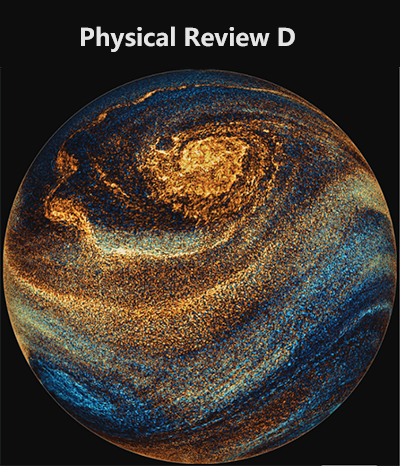带电黑洞的准圆形合并能产生极端黑洞吗?
IF 5.3
2区 物理与天体物理
Q1 ASTRONOMY & ASTROPHYSICS
引用次数: 0
摘要
与能量和角动量相反,电荷在带电黑洞的合并中是守恒的。这开启了残余克尔-纽曼参数$\chi^{2} + \lambda^{2}$大于1的可能性($\chi$和$\lambda$分别是黑洞的无量纲自旋和无量纲电荷),这是宇宙审查猜想所禁止的。本文研究了带电双黑洞的准圆形合并能否形成裸奇点。我们扩展了一个理论模型来估计双星黑洞准圆形合并所留下的残余的最终性质到带电情况。我们用数值相对论模拟验证了该模型,在百分比水平上发现了一致。然后,我们使用我们的理论模型来论证,尽管裸奇点不能在非自旋带电双黑洞的准圆形合并后形成,但有可能产生任意接近极限的残余物。本文章由计算机程序翻译,如有差异,请以英文原文为准。
Can quasicircular mergers of charged black holes produce extremal black holes?
In contrast to energy and angular momentum, electric charge is conserved in mergers of charged black holes. This opens up the possibility for the remnant to have Kerr-Newman parameter $\chi^{2} + \lambda^{2}$ greater than 1 (with $\chi$ and $\lambda$ being the black hole dimensionless spin and dimensionless charge, respectively), which is forbidden by the cosmic censorship conjecture. In this paper, we investigate whether a naked singularity can form in quasi-circular mergers of charged binary black holes. We extend a theoretical model to estimate the final properties of the remnant left by quasicircular mergers of binary black holes to the charged case. We validate the model with numerical-relativity simulations, finding agreement at the percent level. We then use our theoretical model to argue that while naked singularities cannot form following quasi-circular mergers of non-spinning charged binary black holes, it is possible to produce remnants that are arbitrarily close to the extremal limit.
求助全文
通过发布文献求助,成功后即可免费获取论文全文。
去求助
来源期刊

Physical Review D
ASTRONOMY & ASTROPHYSICSPHYSICS, PARTICLES-PHYSICS, PARTICLES & FIELDS
CiteScore
9.30
自引率
36.00%
发文量
3456
期刊介绍:
Physical Review D (PRD) is a leading journal in elementary particle physics, field theory, gravitation, and cosmology and is one of the top-cited journals in high-energy physics.
PRD covers experimental and theoretical results in all aspects of particle physics, field theory, gravitation and cosmology, including:
Particle physics experiments,
Electroweak interactions,
Strong interactions,
Lattice field theories, lattice QCD,
Beyond the standard model physics,
Phenomenological aspects of field theory, general methods,
Gravity, cosmology, cosmic rays,
Astrophysics and astroparticle physics,
General relativity,
Formal aspects of field theory, field theory in curved space,
String theory, quantum gravity, gauge/gravity duality.
 求助内容:
求助内容: 应助结果提醒方式:
应助结果提醒方式:


